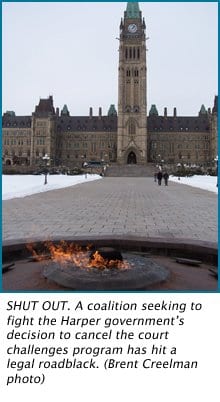A group hoping to fight the Harper government’s decision to kill the court challenges program — a legal-aid fund that helped win the fight for same-sex marriage — won’t be getting its day in court.
On Dec 17, a coalition of eight equality-seeking organizations — supported by Egale Canada and represented by Toronto law-firm Bakerlaw — filed a request to intervene on a case launched against the feds by a French-language rights group. But on Jan 8, Federal Court justice Luc Martineau turned down the request, on the basis that the coalition did not have a direct enough interest in the case to be granted intervener status.
“What the judge found in our motion was that the intersection of equality and language rights wasn’t sufficiently tight or close,” says Faisal Bhabha, a lawyer representing the coalition.
“So essentially, we’ve been shut out of the process.”
Early last year, the Federation of Francophone and Acadian Communities launched the case against the Tories’ decision to cut the court challenges program early last year. In May 2007, Canada’s official languages commissioner blasted the federal government in a report, saying that the cancellation of the court challenges program dealt a “serious blow” to Canadians’ ability to defend their Charter rights.
The case will still go on as scheduled at the end of February in Fredericton, NB, but the court will only deal with language minority rights — not equality rights. Bhabha says this precedent should concern Canadians.
“Basically, if the government wanted to, it could reinstate funding to the language rights portion of the program, but choose not to reinstate funding to the equality rights part of the program,” says Bhabha. “What it means is that equality seekers could be shut out while language minorities get their rights preserved.”
When the court challenges program was created in 1978, it was originally intended to help fund court cases dealing with French language rights, but was expanded to include other minority groups seeking equality rights.
In the 1990s, the program funded a number of cases crucial to advancing gay and lesbian rights. In 1995, a case funded by the program won sexual orientation as a prohibited ground of discrimination. The program also funded challenges to marriage laws in Ontario and BC which led to the recognition of same-sex marriage.
Because of the high cost of legal action, the court challenges program was a key tool to allowing minorities to fight for their Charter rights.
“Organizations like ours struggle to find the money to take on these cases,” Egale executive director Helen Kennedy told Xtra last month. “Now we’ll have to be more selective. It’s very, very significant. It’s a big loss to us.”
The Harper government cancelled the court challenges program in the fall of 2006. The program has been cancelled and revived in the past. After Brian Mulroney’s Conservative government cut the program in 1992, the Liberals brought it back two years later.
— with files from Krishna Rau
For more on this story, check out:
Fighting to restore legal funding — Dec 20, 2007

 Why you can trust Xtra
Why you can trust Xtra


